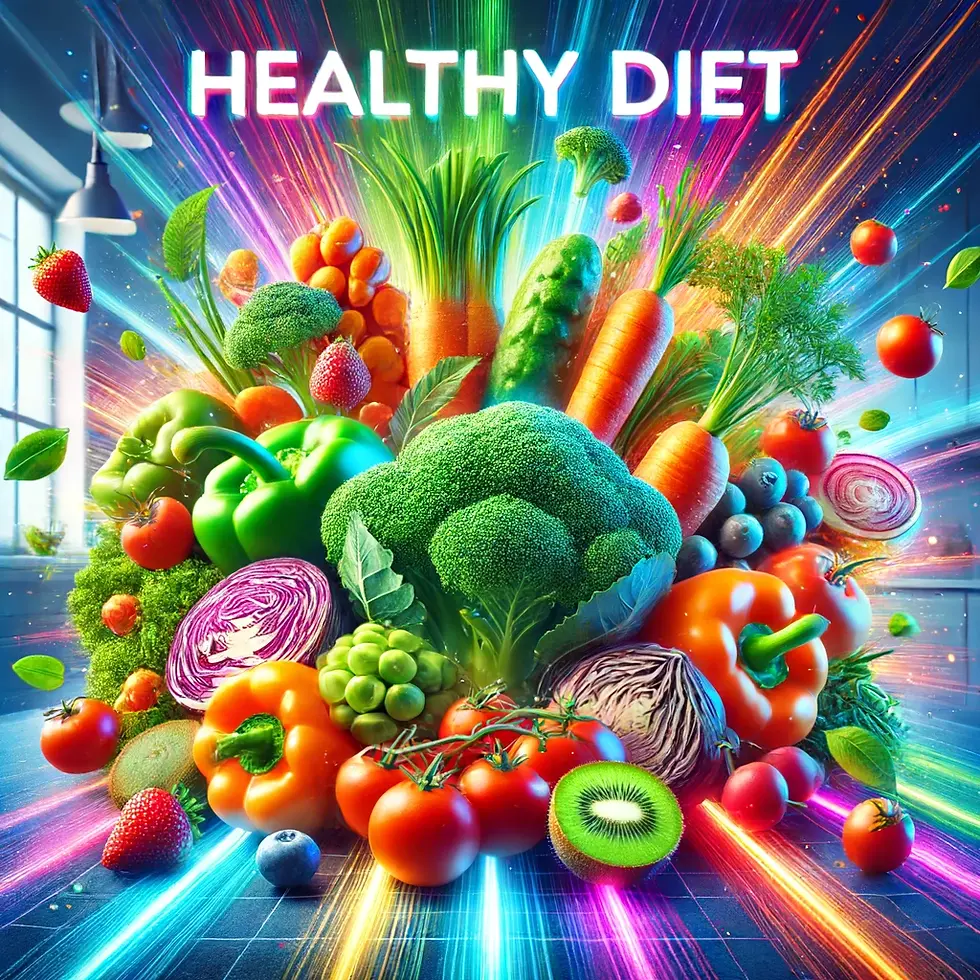Best Vitamins for Brain Function and Memory
- Nathan Chiaratti
- Jun 11, 2024
- 4 min read
Updated: Jun 16, 2024

Introduction
Hello, wellness warriors! Our brains are the control centers of our bodies, responsible for everything from our thoughts and emotions to our movements and memories. To keep our brains functioning at their best, it's essential to provide them with the right nutrients. Vitamins play a crucial role in maintaining brain health and enhancing cognitive function. Today, we’re diving into the best vitamins for brain function and memory. Let’s nourish our minds and boost our brainpower!
1. Vitamin B12
Vitamin B12, also known as cobalamin, is essential for maintaining the health of nerve cells and red blood cells. It plays a crucial role in brain function and DNA synthesis.
Benefits for the Brain:
Supports the production of neurotransmitters, which are chemicals that transmit signals in the brain.
Helps maintain the myelin sheath, the protective covering around nerves.
Reduces the risk of brain atrophy, which is associated with memory loss and cognitive decline.
Food Sources:
Meat, fish, and poultry
Eggs and dairy products
Fortified cereals and nutritional yeast
Pro Tip: If you’re vegetarian or vegan, consider taking a B12 supplement, as plant-based foods generally do not provide adequate amounts.

2. Vitamin D
Vitamin D is often called the "sunshine vitamin" because our bodies produce it in response to sunlight. It's crucial for brain health and cognitive function.
Benefits for the Brain:
Regulates the immune system and reduces inflammation, which can impact brain function.
Supports the production of neurotransmitters.
Enhances mood and reduces the risk of depression.
Food Sources:
Fatty fish (salmon, mackerel, sardines)
Egg yolks
Fortified milk and orange juice
Mushrooms exposed to sunlight
Pro Tip: If you live in an area with limited sunlight, especially during winter months, consider a vitamin D supplement.
3. Vitamin E
Vitamin E is a powerful antioxidant that helps protect cells from oxidative stress and damage, which can affect brain health.
Benefits for the Brain:
Protects brain cells from oxidative damage.
Supports cognitive function and reduces the risk of cognitive decline.
Enhances memory and overall brain health.
Food Sources:
Nuts and seeds (almonds, sunflower seeds, hazelnuts)
Spinach and other leafy greens
Vegetable oils (sunflower, safflower, and olive oil)
Avocados
Pro Tip: Incorporate a variety of vitamin E-rich foods into your diet to ensure adequate intake.
4. Vitamin C
Vitamin C, known for its immune-boosting properties, is also vital for brain health.
Benefits for the Brain:
Acts as a powerful antioxidant, protecting brain cells from damage.
Supports the production of neurotransmitters, which are essential for communication between brain cells.
Enhances cognitive function and reduces the risk of neurodegenerative diseases.
Food Sources:
Citrus fruits (oranges, lemons, grapefruits)
Berries (strawberries, blueberries)
Bell peppers
Broccoli and Brussels sprouts

Pro Tip: Include a variety of colorful fruits and vegetables in your diet to get enough vitamin C.
5. Vitamin B6

Vitamin B6, also known as pyridoxine, is crucial for brain development and function.
Benefits for the Brain:
Supports the production of neurotransmitters, including serotonin and dopamine, which regulate mood and emotions.
Enhances cognitive function and reduces the risk of cognitive decline.
Aids in the formation of myelin, which protects nerve fibers.
Food Sources:
Poultry, fish, and organ meats
Potatoes and other starchy vegetables
Bananas
Chickpeas and other legumes
Pro Tip: Consuming a balanced diet with a variety of foods ensures adequate vitamin B6 intake.
6. Folate (Vitamin B9)
Folate, also known as vitamin B9 or folic acid, is essential for brain function and mental health.
Benefits for the Brain:
Supports DNA synthesis and repair, which are crucial for brain health.
Reduces the risk of cognitive decline and supports memory function.
Helps in the production of neurotransmitters.
Food Sources:
Leafy green vegetables (spinach, kale)
Legumes (beans, lentils)
Fortified cereals and grains
Citrus fruits
Pro Tip: Folate is particularly important for pregnant women, as it supports fetal brain development.
7. Vitamin K
Vitamin K is known for its role in blood clotting, but it also plays a part in brain health.
Benefits for the Brain:
Supports the synthesis of sphingolipids, which are essential for brain cell structure and function.
Protects against cognitive decline and enhances memory.
Reduces inflammation and oxidative stress in the brain.
Food Sources:
Leafy green vegetables (kale, spinach, broccoli)
Fish and meat
Eggs and dairy products
Fermented foods (such as natto)
Pro Tip: Ensure you have a consistent intake of vitamin K-rich foods for optimal brain health.

Conclusion
Vitamins play a vital role in maintaining brain health and enhancing cognitive function. Incorporating these essential vitamins into your diet can help improve memory, focus, and overall mental well-being. Remember, a balanced diet rich in a variety of fruits, vegetables, lean proteins, and healthy fats is the best way to ensure you’re getting all the nutrients your brain needs.
Call to Action: What are your favorite brain-boosting foods? Share your go-to snacks and meals in the comments below. Let’s support each other in nourishing our minds for optimal brain health!
Additional Resources: Check out our posts on Healthy Meal Prep Ideas and The Mind-Body Connection: How Fitness Transforms Your Life Beyond the Gym for more tips and inspiration.
Let’s fuel our brains and enhance our cognitive function with the power of vitamins! 🌟🧠🍎


Comments